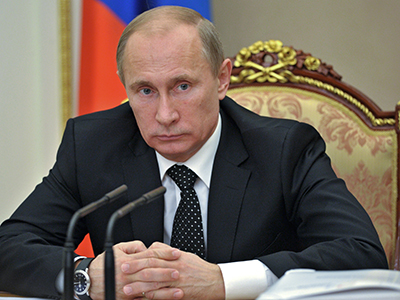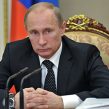
Putin Attempts a Comeback as His Leadership Becomes Precarious
Publication: Eurasia Daily Monitor Volume: 9 Issue: 220
By:

Winter hit Moscow furiously in the last days of November causing colossal traffic jams, but the political climate remains hot as if the electoral season and the government reshuffle did not end in May. President Vladimir Putin announced plans for several trips and scheduled the annual president’s address to the Federal Assembly for mid-December, seeking to catch up on the time he lost walled up in his residence outside Moscow for the past several weeks. Putin indeed needs to block the mutually reinforcing dynamics of spreading discontent and escalating squabbles among the elite clans, but he is set to discover that it is not his health condition that has caused the unseasonal turbulence in Russia’s envisaged “stabilization.” More Russians now think that the country is moving in the wrong direction than believe that it is on the right track (the proportion is 44 percent against 40 percent). And a firmer hand on the steering wheel may only aggravate this blunder (Levada.ru, November 28).
Few people are that concerned about the pains in Putin’s back, but many more are coming to the conclusion that Russia’s far from stellar economic performance cannot support the gargantuan appetite for corruption in government and society. Economic growth has indeed slowed down to fractions of a percentage point in the last quarter, so that the aggregate figure for 2012 is expected to slip below three percent, while inflation is speeding up beyond the target figure of seven percent (Kommersant, November 29). As for corruption, new revelations of embezzlement in the Russian Ministry of Defense have become a daily feature, with a group of low-level officials in St. Petersburg accused of stealing $100 million from communal services (Newsru.com, December 1). Putin cannot present a convincing message that the massively increased flow of corruption scandals amounts to a thorough “cleansing” of his system of power, so his approval ratings keep falling (Nezavisimaya Gazeta, November 30).
In the absence of a coherent program or a meaningful ideology, public support is all Putin can rely upon. Indifferent acceptance would have sufficed, but the polls register a clear growth of the active disapproval of and mistrust in the self-serving executive power (Polit.ru, November 28). The stake-holders in the order—based on a fusion between bureaucratic power and money-making—begin to see Putin as both a focus of public anger and a threat to their privileges, so speculations about his health become a key part of the game of redistributing access to power (Moskovsky Komsomolets, December 1). Putin feels the urgency of restoring control over this game and understands the risk of fragmentation of the anti-corruption campaign, which the feuding clans make into a key instrument of settling scores. Seeking to shift the political attention to a new direction, he suggested introducing direct elections to the Federation Council and raised the possibility of changing the Constitution (Kommersant, December 1).
Strictly speaking, there is no need to amend the Constitution, particularly since the liberal opposition aims to curtail the enormous power granted to the president by this document. But Putin is preoccupied with preempting possible plots among the elites. Putin’s understanding of the nature of the evolving political crisis is deformed by his predisposition to see conspiracies, involving even his junior partner Prime Minister Dmitry Medvedev (Moscow Echo, November 30). Medvedev indeed tries to take advantage of the weakening of Putin’s grasp on power, declaring his intentions to return to the Kremlin and praising the performance of his government—despite poignant criticism from the president and falling approval ratings (Gazeta.ru, November 30). Nevertheless, he cuts a spineless figure for the disgruntled elites, who have amassed such fortunes that their basic instinct of servility is overruled by the desire to enjoy life. The threat of being fired is not that grave for most ministers and governors, who can retire to their mansions in London or chalet in Switzerland; and even their aides know that the newly-launched anti-corruption investigations typically produce more noise than punishment (Vedomosti, November 29).
Putin is disappointed in his elites but not attentive enough to their plots because they skillfully channel his worries toward the conspiracies allegedly brewing from within the “white opposition” camp (Novaya Gazeta, December 1). The accusations that Sergei Udaltsov and other “leftists” were trained abroad in organizing “color revolutions” would have appeared absurd were the tightly controlled judges not measuring real jail sentences for them (Newsru.com, November 30). The newly-elected Coordination Council of allied opposition parties tries to re-energize the protests by staging a street rally in Moscow on December 15. For the Kremlin, however, it is the letter from Mikhail Khodorkovsky that constitutes evidence of the conspiracy, in which each street action is part of a plan for destabilizing the country (Grani.ru, November 27). Khodorkovsky, in fact, actually calls for toning down the revolutionary rhetoric and opening negotiations with the authorities, insisting that Putin’s centrality in the real power system in Russia cannot be ignored (New times, November 29).
This centrality has incidentally undermined Putin. He gathered too much control and then had to relax it, letting the subordinates discover that they do not actually need Putin’s intrusive and capricious arbitration. Therefore, a new tightening of control is evasively but effectively sabotaged. On Russian television, Putin was presented as a larger-than-life leader with unlimited capacity for problem-solving, so his sudden shrinking to an ageing and frail paper-pusher was a revelation of the propaganda fraud. His carefully orchestrated comeback to top form, therefore, does not bring back the respectful fear of the elites nor the sincere reverence in public opinion. He has lost support among urban middle classes in the course of a crudely manipulated return to the summit of power last winter and spring but was able to weather the wave of street protests; a new erosion of trust in his core support base and new tremors of discontent inside the corrupt bureaucratic pyramid add to the incapacitation of his leadership. A sliver of power slips out of Putin’s hands every day, and he finds himself reduced to playing with only the trappings.




